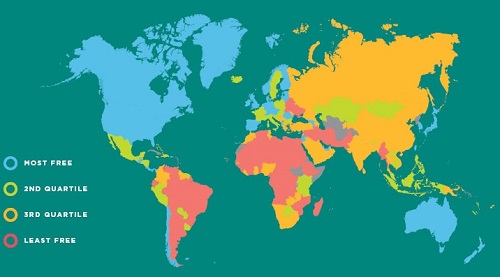
The Fraser Institute brought good news as it released its annual “Economic Freedom of the World” report this morning. The United States has surged in the rankings compared to two years ago.
“Canada has gone from being a top five country two years ago, to barely hanging in the top 10 on this year’s index,” said Fred McMahon of the Fraser Institute. “On the other hand, the United States has improved from 13th to sixth.”
The institute defines economic freedom as how freely resources change hands by personal choices instead of centralized state planning.
“Higher taxes and growing regulation at the federal level and in some provinces have made Canadians materially less economically free,” McMahon said. “This should be worrying to all Canadians, as lower levels of economic freedom leads to slower economic growth and less investment.”
The United States and Canada tied for eleventh place in last year’s report, but experts say this is historically anomalous.
“Typically, the United States was very close to the top – second, third, or fourth place,” said Ian Vasquez, director of the Cato Institute’s Center for Global Liberty and Prosperity. “That began to change in 2000,” he said.
Under the Bush administration … there was a fairly steady decline that accelerated with the Obama administration.”
However, the last years of Obama’s presidency saw ‘a slow uptick in economic freedom for the United States.” This year’s report are based on statistics from 2016, the most recent year for which data are available.
“It is still below, notably below the high level of economic freedom the United States had in the year 2000, when this long-term decline began,” Vasquez told this morning’s Cato Daily Podcast.
The annual report, which dates back to 1970, measures 42 variables that cluster into five categories: size of government, the legal system and protection of private property rights, sound money, freedom to trade internationally, and overall government regulation.
The 10 most economically free nations in 2016 were:
- Hong Kong
- Singapore
- New Zealand
- Switzerland
- Iceland
- United States of America
- Georgia
- Mauritius
- United Kingdom
- Australia/Canada (tie)
The 10 least economically free nations in 2016 were:
- Sudan
- Guinea-Bissau
- Angola
- Central African Republic
- Republic of Congo
- Syria
- Algeria
- Argentina
- Libya
- Venezuela.
Certain countries – including North Korea and Cuba – are not ranked, due to lack of data.
Supposedly democratic socialist nations such as Denmark (16) and the Netherlands (18) ranked higher than Germany (20) and Luxembourg (25).
Other noteworthy findings about European nations include Estonia and Lithuania (tied at 13), Malta (17), Latvia (23), Austria (27), Spain (30), Belgium (52), Italy (54), France (57), Slovenia (71), and Russia (87).
The lowest-ranking European nation, Greece, tied with China at 108.
McMahon worries that Chinese interference “will ultimately lead to deterioration in Hong Kong’s top position, particularly in rule of law, which helps ensure equal freedom for all.”
“Citizens in China continue to be far less free economically than citizens in virtually all jurisdictions and countries within the region,” he said.
This year’s survey adds three nations: Belarus (123), Iraq (152), and Sudan (153). In all, the report provides ratings for 162 of the world’s 192 nations.
The world’s overall level of economic freedom has held steady since 2000, with some decline among the world’s most developed nations.
“The high-water mark was the year 2000,” Vasquez summarized, “and the rich countries are not yet at that level.”
Why Christians should care
People of faith should care about economic freedom for numerous reasons, including the fact that economic and religious freedom are correlated.
“To undertake the direction of the economic life of people with widely divergent ideals and values,” wrote Friedrich von Hayek in The Road to Serfdom, guarantees that “the best intentions cannot prevent one from being forced to act in a way which to some of those affected must appear highly immoral.”
You can compare this year’s report with last year’s findings.
You can read the full report here.
(Photo credit: Fraser Institute.)

